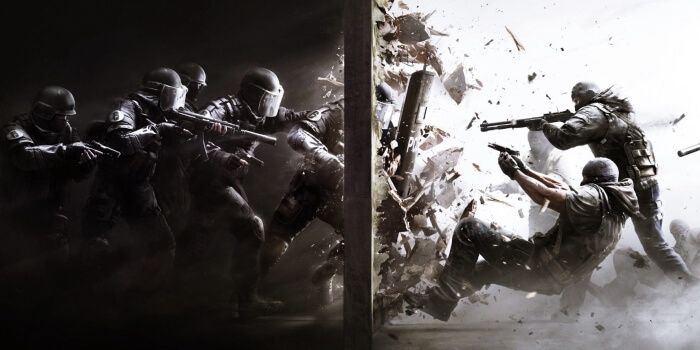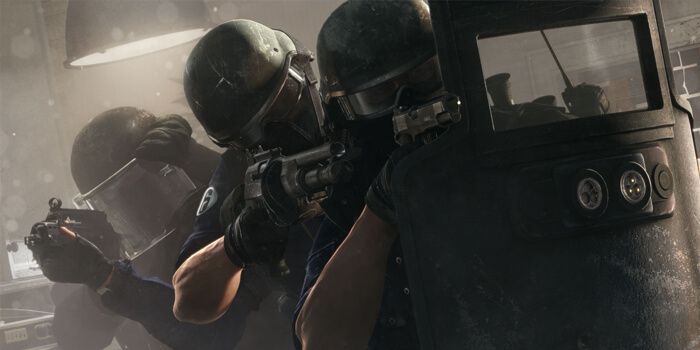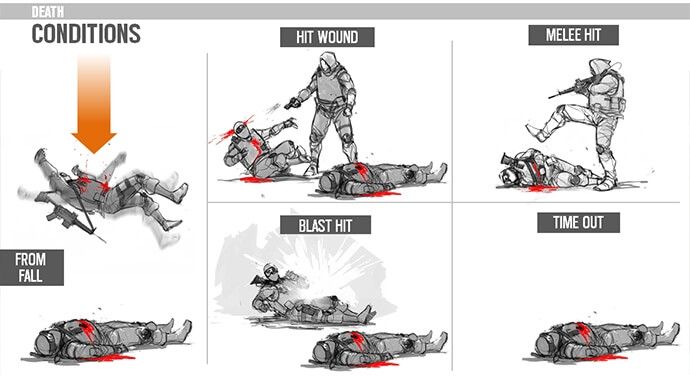In this modern age, there is no video game franchise more well-known to the mainstream than Call of Duty, with even non-gamers aware of the endless churn of kills and deaths that the modern shooter makes possible. But not every video game studio is following suit, as Ubisoft made it clear when they revealed Rainbow Six Siege at E3 2014 that in their game, a slow and steady approach was best. And to make sure that the point is driven home, the game won't simply return downed players back into the fight in the name of fun - once you're down, you're down for the count.
That thinking seems an exact opposite to what a publisher or shooter would aim for, as Titanfall used its emphasis on returning to a fight quickly as a selling point. It's not hard to see why, since respawns have become every bit as expected as using the left trigger to aim, even if they first require players to count to ten and think about where they went wrong before jumping back into the fight. But in a blog post on their website, the Ubisoft team behind Rainbow Six Siege explained that the 'No Respawn' rule wasn't in place from the start.
As we learned when speaking with the team and playing Siege for ourselves, the project began to pick up steam when three core pillars of the experience were identified: Teamwork, Tactics, and Tension. The first gameplay video showed all three of those at play - and the fact that every player's life really was on the line (in the round, at least).
But when the team got to internally testing Siege, they did so without the 'no respawn' rule - which the team now refers to as One Life - and immediately found that the most seasoned 'lone wolf' shooters found their way to the top of the leaderboards time and again. But when creative director Xavier Marquis wondered what would happen if respawns were removed, they got a very clear answer. Suddenly, the lone wolves struggled, and the players who exercised patience instead of running and gunning started coming out on top.
Siege designer and former SOCOM dev Chris Lee offers more insight:
"It was a surprisingly good change and we didn’t think it was going to work. I thought that only the most hard-core players would like it. It turned out that it really opened up the game to many different types of players. The developers who were longtime FPS players initially found it difficult because they were only good at reaction time. They weren’t communicating, playing tactically, or thinking about the consequences.
"Developers who weren’t as good before played slower, thought carefully about the situation, and ended up doing better on the leaderboard. Because One Life rewards this kind of behavior, it puts well-rounded players at an advantage over pure run and gunners, which is what the Tom Clancy’s franchise is all about. They utilize a complete skill set and the rest of the development team really liked that, since going back to its roots is what we wanted to do and the rule stuck. It wasn’t something we predicted, and we were really happy with how it turned out."
The lasting impression from our play session was just how slowly the match began, with the opposing team (either those attacking or defending) began weighing their options before attacking. Would that change if the players knew a respawn awaited them? It's hard to say. But Ubisoft seems to think so, and there's no denying the tension of knowing you're one bad decision away from becoming a spectator.
The developers add that even if you're removed from the action, you're not technically out of the fight; assuming that you recall the 'teamwork' part of the game's three pillars. Downed players may still gain access to security cameras or remote controlled drones, offering advice and warnings to their teammates still in the match.
Whether the remaining team will have time to react once bodies start dropping isn't a guarantee, but any mechanics that give more patient, cautious players an edge - while increasing the challenge and stakes, as opposed to lowering them - is likely worth considering. And going by the accolades Siege has received thus far, that's something most gaming outlets believe as well.
What are your thoughts on the change? Do you think Ubisoft knows the audience they're targeting with a less forgiving approach to round-ending death, or are they underestimating how frustrated players might be if they're forced to watch a three-minute round from the bleachers?
Rainbow Six Siege will release on PC, PS4 and Xbox One but currently has no release date.
Follow me on Twitter @andrew_dyce.
Source: Ubisoft



